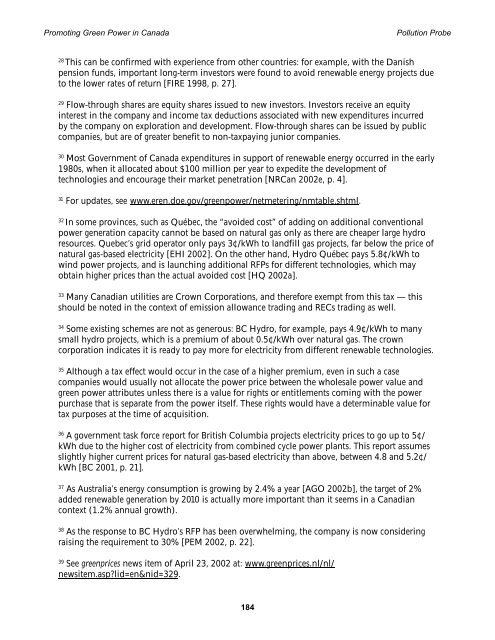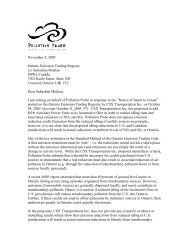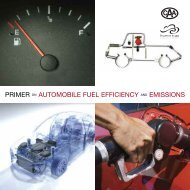Promoting Green Power in Canada - Centre for Human Settlements
Promoting Green Power in Canada - Centre for Human Settlements
Promoting Green Power in Canada - Centre for Human Settlements
- No tags were found...
Create successful ePaper yourself
Turn your PDF publications into a flip-book with our unique Google optimized e-Paper software.
<strong>Promot<strong>in</strong>g</strong> <strong>Green</strong> <strong>Power</strong> <strong>in</strong> <strong>Canada</strong> Pollution Probe28This can be confirmed with experience from other countries: <strong>for</strong> example, with the Danishpension funds, important long-term <strong>in</strong>vestors were found to avoid renewable energy projects dueto the lower rates of return [FIRE 1998, p. 27].29Flow-through shares are equity shares issued to new <strong>in</strong>vestors. Investors receive an equity<strong>in</strong>terest <strong>in</strong> the company and <strong>in</strong>come tax deductions associated with new expenditures <strong>in</strong>curredby the company on exploration and development. Flow-through shares can be issued by publiccompanies, but are of greater benefit to non-taxpay<strong>in</strong>g junior companies.30Most Government of <strong>Canada</strong> expenditures <strong>in</strong> support of renewable energy occurred <strong>in</strong> the early1980s, when it allocated about $100 million per year to expedite the development oftechnologies and encourage their market penetration [NRCan 2002e, p. 4].31For updates, see www.eren.doe.gov/greenpower/netmeter<strong>in</strong>g/nmtable.shtml.32In some prov<strong>in</strong>ces, such as Québec, the “avoided cost” of add<strong>in</strong>g on additional conventionalpower generation capacity cannot be based on natural gas only as there are cheaper large hydroresources. Quebec’s grid operator only pays 3¢/kWh to landfill gas projects, far below the price ofnatural gas-based electricity [EHI 2002]. On the other hand, Hydro Québec pays 5.8¢/kWh tow<strong>in</strong>d power projects, and is launch<strong>in</strong>g additional RFPs <strong>for</strong> different technologies, which mayobta<strong>in</strong> higher prices than the actual avoided cost [HQ 2002a].33Many Canadian utilities are Crown Corporations, and there<strong>for</strong>e exempt from this tax — thisshould be noted <strong>in</strong> the context of emission allowance trad<strong>in</strong>g and RECs trad<strong>in</strong>g as well.34Some exist<strong>in</strong>g schemes are not as generous: BC Hydro, <strong>for</strong> example, pays 4.9¢/kWh to manysmall hydro projects, which is a premium of about 0.5¢/kWh over natural gas. The crowncorporation <strong>in</strong>dicates it is ready to pay more <strong>for</strong> electricity from different renewable technologies.35Although a tax effect would occur <strong>in</strong> the case of a higher premium, even <strong>in</strong> such a casecompanies would usually not allocate the power price between the wholesale power value andgreen power attributes unless there is a value <strong>for</strong> rights or entitlements com<strong>in</strong>g with the powerpurchase that is separate from the power itself. These rights would have a determ<strong>in</strong>able value <strong>for</strong>tax purposes at the time of acquisition.36A government task <strong>for</strong>ce report <strong>for</strong> British Columbia projects electricity prices to go up to 5¢/kWh due to the higher cost of electricity from comb<strong>in</strong>ed cycle power plants. This report assumesslightly higher current prices <strong>for</strong> natural gas-based electricity than above, between 4.8 and 5.2¢/kWh [BC 2001, p. 21].37As Australia’s energy consumption is grow<strong>in</strong>g by 2.4% a year [AGO 2002b], the target of 2%added renewable generation by 2010 is actually more important than it seems <strong>in</strong> a Canadiancontext (1.2% annual growth).38As the response to BC Hydro’s RFP has been overwhelm<strong>in</strong>g, the company is now consider<strong>in</strong>grais<strong>in</strong>g the requirement to 30% [PEM 2002, p. 22].39See greenprices news item of April 23, 2002 at: www.greenprices.nl/nl/newsitem.asp?lid=en&nid=329.184
















